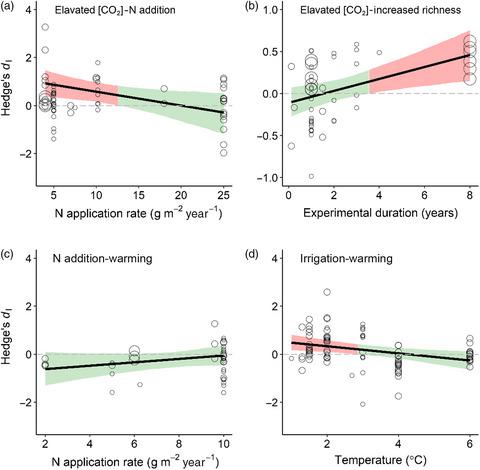Our official English website, www.x-mol.net, welcomes your feedback! (Note: you will need to create a separate account there.)
Interactive effects of global change factors on terrestrial net primary productivity are treatment length and intensity dependent
Journal of Ecology ( IF 5.3 ) Pub Date : 2020-02-28 , DOI: 10.1111/1365-2745.13379 Zilong Ma 1 , Han Y. H. Chen 2 , Yongchun Li 1, 3 , Scott X. Chang 1, 3
中文翻译:

全球变化因素对地面净初级生产力的互动影响取决于处理时间和强度
更新日期:2020-02-28
Journal of Ecology ( IF 5.3 ) Pub Date : 2020-02-28 , DOI: 10.1111/1365-2745.13379 Zilong Ma 1 , Han Y. H. Chen 2 , Yongchun Li 1, 3 , Scott X. Chang 1, 3
Affiliation

|
- Individual effects of co‐occurring global change factors on net primary productivity (NPP) have been widely studied; however, their interactive effects remain highly debated.
- Here, we conducted a global meta‐analysis based on 919 multifactor observations from 120 published studies to examine the interactive effects on NPP of global change factors including elevated [CO2], warming, nitrogen addition, irrigation, drought and changes in species diversity.
- On average, of the factors studied, six pairs of factors had additive and two pairs had synergistic interactions. Importantly, some of those interaction types changed over time and with treatment intensity. The synergistic interaction between elevated [CO2] and nitrogen addition became additive at high nitrogen addition rates, whereas the synergistic interaction between irrigation and warming diminished at higher temperatures. Over time, the additive effect between elevated [CO2] and increased species richness switched to synergistic. Other global change factor pairs—including elevated [CO2] and warming, nitrogen addition and increased richness, irrigation and N addition, as well as drought and increased richness—remained additive regardless of their treatment intensity or experimental duration. Interaction types of those global change factor pairs did not vary with ecosystem types assessed in our study.
- Synthesis. Our results suggest that the assumptions of static effects through time or ignoring treatment intensity effects will provide inaccurate predictions of the interactive effects of global change factors on terrestrial NPP. Understanding the context‐dependent nature of interactive effects is crucial for validating Earth system models and predicting future NPP responses to co‐occurring global change drivers.
中文翻译:

全球变化因素对地面净初级生产力的互动影响取决于处理时间和强度
- 共同发生的全球变化因素对净初级生产力(NPP)的个体影响已得到广泛研究;但是,它们的互动效果仍存在争议。
- 在这里,我们基于120项已发表研究中的919项多因素观察进行了一项全球荟萃分析,以研究全球变化因素(包括升高的[CO 2 ],变暖,氮添加,灌溉,干旱和物种多样性变化)对NPP的相互作用。
- 平均而言,在研究的因素中,六对因素具有加性关系,两对因素具有协同作用。重要的是,其中一些相互作用类型随时间和治疗强度而变化。在较高的氮添加速率下,升高的[CO 2 ]与氮的添加之间的协同相互作用成为加和的作用,而在较高的温度下,灌溉与增温之间的协同相互作用则减弱。随着时间的流逝,[CO 2 ]升高与物种丰富度增加之间的累加效应变为协同效应。其他全球变化因素对-包括升高的[CO 2),增温,增加氮肥和增加肥度,灌溉和氮肥以及干旱和增加肥度-无论它们的处理强度或试验持续时间如何,都仍然是添加剂。这些全球性变化因素对的相互作用类型并未随我们研究中评估的生态系统类型而变化。
- 综合。我们的结果表明,通过时间得出的静态影响或忽略治疗强度影响的假设将无法预测全球变化因子对地面NPP的相互作用。了解交互作用的上下文相关性质对于验证地球系统模型和预测未来NPP对共同发生的全球变化驱动因素的响应至关重要。











































 京公网安备 11010802027423号
京公网安备 11010802027423号